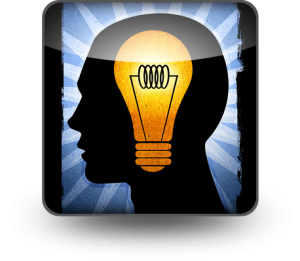Readers who have viewed my Scoop-it page will have come across a blog post that I ‘scooped’ called ‘Intentional reflection for intentional outcomes’. Some may wonder why I ‘scooped’ it due to its use of customer service experiences to frame its discussion. I must be clear here – I, like many others, view the higher education experience as totally opposed to, and worlds apart from, a customer service one and I deplore any attempt to reframe teachers/tutors as service providers. That being said, the overall message of the ‘Intentional reflection’ blog post, and some of the specific comments made within it, struck a chord with me because intentional reflection is what I believe learning outcomes can help students to achieve. Consider the following paragraph from the post:
I happen to believe (and have witnessed repeatedly) that intentional reflection can foster intentional outcomes. If the customer service representatives that I worked with this past month are finding a multitude of angry, negative customers, who respond in unpleasant ways, they might consider modifying their own strategies. Especially if they’re motivated to receive the highest ratings on customer service surveys, they might consider an augmented approach. They might match their desired outcomes with their current practice, and through intentional reflection, consider wherein lie breaks in the chain. Through that style of intentional reflection, connected analysis, and open adaptation, any one of us can enhance our practice…to whatever ends we aspire.
This paragraph could easily be adapted to represent a learning situation too:
I happen to believe (and have witnessed repeatedly) that intentional reflection can foster intentional outcomes. If the students that I worked with in the past are finding a multitude of low marks for assignments or are struggling to understand content covered and stay abreast in lectures/seminars, they might consider modifying their own strategies. Especially if they’re motivated to achieve the highest marks on assignments, they might consider an augmented approach. They might match their desired outcomes with their current learning/studying practices, and through intentional reflection, consider wherein lie breaks in the chain. Through that style of intentional reflection, connected analysis, and open adaptation, any one of us can enhance our practice…to whatever ends we aspire.
The research that we have conducted in the ‘Learning Outcomes Project’ suggests that learning outcomes are currently more useful to tutors in the design and planning of their modules or courses (discussed further in a forthcoming paper). Many academics that we interviewed further indicated that learning outcomes act as a guide for students, directing them to what they are expected to learn within a particular module/course. Framed in this way, learning outcomes could be viewed as a forward looking tool, i.e. guiding students as to where they should be/will be directing their future learning efforts.
However, they could also be a tool that encourages students to engage in intentional reflection as they are progressing through the module and once they have completed it – indeed, it seems a missed opportunity if learning outcomes are not used in this reflective way. Half way through a module, for example, students might intentionally reflect on (or self-assess) their progress towards meeting some of the pre-defined learning outcomes. If they are not happy with their progress towards achieving particular outcomes, they might consider ‘wherein lie breaks in the chain’. Are their study practices as effective as they could be? Are they directing their efforts to relevant topics, sources, etc? Have they been studying the topic at the level required? At the end of the module, students could engage in the same sort of reflective process again. Do they feel that they sufficiently achieved the learning outcomes? If not, why not? Are they using appropriate learning strategies? What might they need to modify in their studying practices?
I do not mean to imply here that if a student does not achieve a learning outcome, then the fault must lie only with them. And for this very reason I would suggest that this reflective process, both during and at the end of modules, should occur in dialogue with the tutor. For example, if many students in a class do not feel confident that they are on track to achieve a particular outcome, is that because there needs to be more time spent covering it in sessions? I refer here to a paper I wrote with a colleague about basing module/course evaluations around dialogue between students and tutors. We make the point that evaluation activities that involve this type of dialogue could enhance student-teacher relationships and result in a more meaningful evaluation process:
Evaluation activities that involve discourse between students and educators lead to richer, more specific feedback being gained and offer opportunities for course development to occur as a collaborative project. These approaches demonstrate to students that educators are also engaged in a learning process. Where rich evaluative discourse takes place within a course it can come to be seen as a natural part of the collaborative learning process being undertaken rather than a supplementary monitoring process owned exclusively by management (p.146).
The learning outcomes of a module or course could provide a framework to base some of these student-educator discussions around. Again, we make this point in the paper:
We argue that in the same way that students must understand and be engaged in the purpose and goals of assessment in order to make effective use of the assessment feedback, both educators and students must understand and be engaged in the purpose and goals of the course in order to engage effectively in course development. This is not to advocate generic processes for courses to follow, rather to suggest that as part of the reflective evaluation process educators should be clear themselves and with students about their own goals for the course. This is for two main reasons. Firstly, if students and teachers have a common understanding of the specific goals of the course (content and learning outcomes), feedback given through evaluation activity may be much more purposeful, direct and meaningful. Secondly, this greater level of transparency may help to ensure that students feel that their role in the evaluative process is significant rather than tokenistic as they are allowed to understand the educators’ or course team’s intentions and ambitions and are invited to take some collaborative ownership of these. By sharing goals and priorities for course developments with students and inviting their participation in the development of these ambitions, students are empowered to contribute purposefully and to claim some ownership of course development (p.146/7).
The paper I am referring to here is concerned primarily with module/course evaluations. However, it supports my point that learning outcomes could be used as a tool that encourages intentional reflection by students and tutors, both as individuals and in dialogue with each other.






 Subscribe to Kerry Dobbins's posts
Subscribe to Kerry Dobbins's posts
Recent Comments